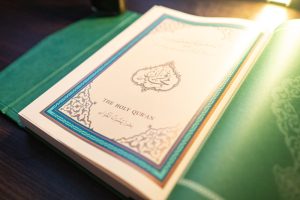
© Shutterstock
The Review of Religions is honoured to present the first ever full English translation of the commentary of Sūrah al-Falaq, Chapter 113 of the Holy Qur’an, from Hazrat Mirza Bashiruddin Mahmud Ahmad’s (ra) magnum opus, Al-Tafsīr Al-Kabīr.
Excellences of Sūrah al-Falaq
There is a narration in Muslim, al-Tirmidhī and al-Nasā’ī:

‘Upon receiving the revelation of Sūrah al-Falaq and Sūrah al-Nās the Holy Prophet (sa) remarked, “There have been such unique verses revealed to me tonight the like of which have not been revealed before.” And thereafter, he recited Sūrah al-Falaq and Sūrah al-Nās.” [1]
On the one hand these chapters summarise the Holy Qur’an, and on the other hand they contain profound themes, some of which relate to prophecies pertaining to the future. It is for this reason that the Holy Prophet (sa) regards these chapters as unparalleled which signifies their excellences and profound subject matter.
Al-Bukhārī, Abū Dāwūd, al-Nasā’ī and Ibn Mājah narrate on the authority of Ḥaḍrat ‘Ā’ishah (ra):

This means that at night when the Holy Prophet (sa) would retire he would join the palm of his hands together and recite Sūrah al-Ikhlāṣ, Sūrah al-Falaq and Sūrah al-Nās, and then blow inside both his palms and pass [his hands] across his entire body from head to toe. He would repeat this three times. Moreover, the ḥadīth states that he who recites these two chapters along with Sūrah al-Ikhlāṣ in the morning and evening, they will be sufficient for him to safeguard against misery and grief. [3]
This means that the teachings of the Qur’ān safeguards man from distress because one who recites al-Muʿawwidhatān [4] in the morning and evening will necessarily be reminded of the summary of the teachings of the Holy Qur’ān. Furthermore, one who is reminded of the Qur’anic teachings, morning and evening, will also consider acting upon them. And in this way they shall be safeguarded against suffering. Similarly, Ibn Mardawiyyah narrates from ‘Uqbah bin ‘Āmir that the Holy Prophet (sa) states that:
[5] إِقْرَؤُوْا بِالْمُعَوِّذَاتِ فِيْ دُبُرِ كُلِّ صَلَاةٍ.
In other words, this means, ‘O people! Recite Sūrah al-Falaq and Sūrah al-Nās after every prayer.’ Similarly, Ibn Mardawiyyah narrates on the authority of Ḥaḍrat Umm-e-Salamah that the Holy Prophet (sa) stated:

That is, the most beloved chapters of Allah Almighty are Sūrah al-Falaq and Sūrah al-Nās.
There is also a narration to the effect that the Holy Prophet (sa) would combine the recitation of Sūrah al-Ikhlāṣ and Mu‘awwidhatain in the last rak‘ah of the Witr [6] prayer.[7]
All these narrations reveal the virtues and excellences of these chapters, enjoining us to focus on Allah Almighty at all times, and to pray continually to remain under His protection. Since the last rak‘ah of the Witr prayer concludes the prayers of the day, the Holy Prophet (sa) would recite these two chapters together in this final rak‘ah. As for his saying, ‘Whoever recites these chapters in the morning and evening will be saved from calamity implies that one should begin their day with the teachings of the Qur’ān and also end their day with them.’
Some have expressed the view that Sūrah al-Falaq and Sūrah al-Nās are not part of the Holy Qur’an, albeit they acknowledge that the Holy Prophet (sa) had instructed that they be written down along with the rest of the Holy Qur’an. Upon reaching the end of the Holy Qur’an the Holy Prophet (sa) would recite these chapters, and would direct others to do so as well. Despite this they deem these chapters to be separate from the Qur’an. This view was held by Ḥaḍrat ‘Abdullah bin Mas‘ūd (ra) – who was from among the Holy Prophet’s (sa) closest companions – but it is not based on any evidence. Evidence can only be substantiated when an incident occurs and someone either sees or hears it. That is, either the testimony of the one who witnessed the incident himself or the one who attributes it to another and quotes their words. However, Ḥaḍrat ‘Abdullah bin Mas‘ūd (ra) did not state that he heard the Holy Prophet (sa) deny them being part of the Holy Qur’an.[8] Rather, he averred that the Holy Prophet (sa) was commanded to seek refuge with Allah through these two chapters, and since they were both a means of seeking protection, it appeared to him as though the Holy Qur’an had reached its end. Evidently, this is merely a conjecture on his part. In contrast, other eminent companions mention that these two chapters were dictated to them by the Holy Prophet (sa) as being part of the Holy Qur’an.
This view of Ḥaḍrat ‘Abdullah bin Mas‘ūd (ra) is of no consequence because even by his own admission, they were written down, and recited as part of the Holy Qur’an during the time of the Holy Prophet (sa). Thus, these chapters are certainly part of the Holy Qur’an, and God Almighty selected them to mark the end of the Holy Qur’an.
Serialisation of Sūrah al-Falaq will continue in the next edition.
ENDNOTES
- Rūḥ al-Ma‘ānī.
- Ṣaḥiḥ al-Bukhārī, Kitāb Faḍā’il al-Qur’ān.
- Rūḥ al-Ma‘ānī.
- It refers to the last two chapters of the Holy Qur’an that seek Allah’s refuge from all
evil. [Publisher] - Al-Durr al-Manthūr fī al-Tafsīr bi al-Ma’thūr
- A prayer offered after the ‘Ishā’ prayer or before the Fajr prayer. [Publisher]
- Al-Durr al-Manthūr fī al-Tafsīr bi al-Ma’thūr
- Rūḥ al-Ma‘ānī.




Add Comment